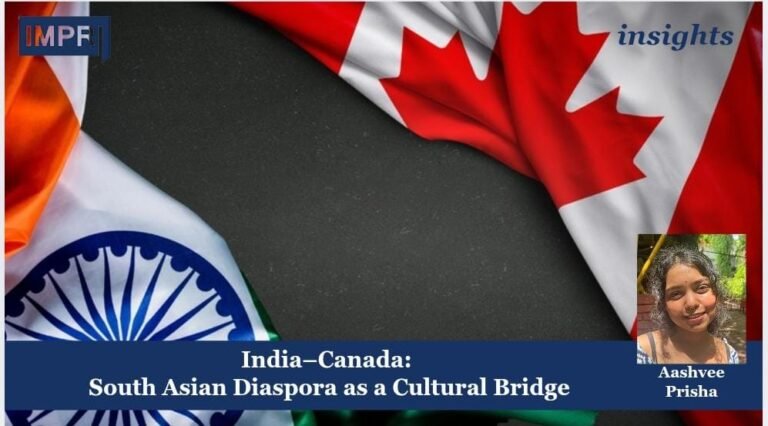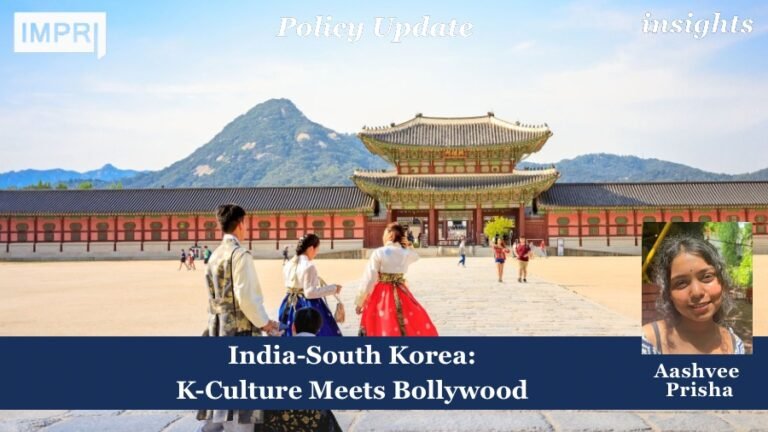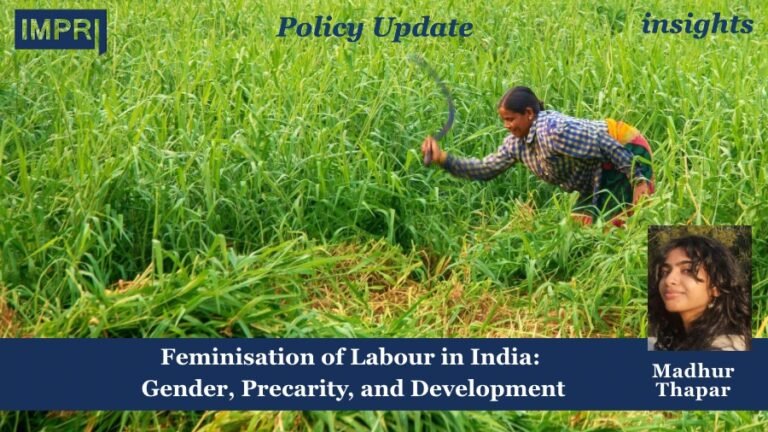Pradeesha C
Introduction
The Parliament passed the Women’s Reservation Bill in September 2023, marking
completion of a long pending demand. Despite being one of the few countries to grant
women voting rights immediately post-independence, India faced a serious issue, and that
was heavy underrepresentation of women in the legislative domain.
In the recent 2024 general elections, out of the total 96.8 crore electors, 47.3 were women and polling percentage of women was higher than that of men (65.8% for women and 65.6% for men).
Despite this, women constitute only about a meagre 9.5% of the total candidates out of whom
only 74 were elected to the Lok Sabha i.e.,13.6% of women. This trend shows us that women
are not engaging themselves in active politics and discourses unlike their male counterparts.
But will this Act alone increase the participation of women in higher legislative positions?
Defining politics as an avenue
Now, imagine a group of individuals sitting by a neighbourhood tea shop, with freshly printed
newspapers at hand, discussing politics, right from local elections and parties to the UN
security council meetings and their implications. What picture comes to your mind? And
what is the gender of the individuals?
I’m sure most of you would have imagined men as the subjects of discussion. This very
simple example makes us understand how politics is often seen and lived as a male
dominated field.
In the layman’s understanding, politics essentially means consolidating power. With the
presence of a patriarchal society, this stance takes much precedence, thereby systematically
excluding women from the public domain, claiming that women cannot handle power.
In such a case, mere legal provisions alone cannot be sufficient in bringing women to
political leadership and decision-making roles. There needs to be a more qualitative analysis
on the improvement of women’s participation in politics.
Why political awareness matters for women?
According to Zaller political awareness means ‘‘the extent to which an individual pays
attention to politics and understands what he or she has encountered’’ (Zaller 1992, 21). This
essentially means that when an individual is politically aware, then he/she gains the ability to
observe, interpret, analyse, and make their own understanding on the day to day social and
political issues.
This also means that the individual gets to be a part of the consensus (usually electoral)
either directly or indirectly, thereby giving them an agency and control over what they deem right and want. But when an individual is politically unaware, then he/she is at the receiving
end of what others decide for them.
So, when women are politically unaware, they keep losing their voices to the other majority
which choses to conveniently ignore the needs of women, (eg, lack of gender budgeting). In
India this trend of women voting in elections, without being fully aware of what its political
implications are, simply makes it a meaningless ritual.
This state of political illiteracy is not brought about by intentional neglect or simply being
apolitical, but has a more complex explanation to it. This issue should be analysed through
various lenses like gender, caste, religion, class, literacy, social standing, access to resources,
financial independence, etc.
Reasons for reduced political awareness in women
The main reason for a majority of women being distant from active political discourse is the
societal background and lower levels of freedom enjoyed by them
From a young age, girls are often kept away from the outside world, limiting their interaction
with the public sphere, constantly policing their actions, etc and this shapes them into women
who are only worried about what happens within the house. As paradoxical as it may seem,
quite a large sum of literate women and graduates who have voted have little to no idea of
what politics essentially is.
This pushes a wrong narrative among young girls that they are not meant to entertain politics,
considering it to be something dirty, and something that could compromise their safety. It also
results in a vicious cycle of “Self-Stereotyping” where women subconsciously diminish their
value and presence based on the existing social norms.
Another factor that creates this gap is the aspect of emotional and domestic labour. While the
men of the house enjoy a period of leisure after a long day’s work, the women continue to be
deprived of it due to their routine of managing the household and taking care of everyone’s
emotional needs, despite being exhausted after a long day themselves. Now when women
finally find space for leisure, the intimidating headlines and complex political debates often
seem to exhaust their energy and in trying to shift their focus away from it, they involuntarily
become apolitical.
Also, the way public spaces are organized is also a political statement which demarcates
spaces with the gender of the people occupying it in the majority. The Indian Tea stalls are
the best example that defines this scenario. Men use that space as a break room, a space for
colleague, peer and community interaction, and thus the discourse of politics also finds it’s
space amidst the steams and sips of hot piping tea.
Women are always kept away from such public gathering with their peers in such frequency
because of the constant societal and familial expectations, thus curtailing their exposure and
access to public spaces, creating little to no avenue for a common woman to discuss and
debate politics.
Then comes the last nail on the coffer which is direct neglect of women in political parties.
The political parties make use of their female members at the lower levels for campaigning, spreading party agenda, and other such works. But when it comes to giving them higher
positions in the party cadre, the parties suddenly go silent.
This fact became much evident when many political parties, including several national parties
who spoke in favour of women’s participation in politics indirectly denied party tickets for
their female members citing “winnability factor” and kept them away from the higher
positions of party power for years.
Now this creates a “Gender Aspiration Gap”. It essentially means that women intentionally
avoid leadership roles in politics, knowing the extra hurdles ahead existing purely on virtue
of their gender.
Dilemmas around the act and way forward
One of the main areas of concern is the issue of tokenism/proxies taking over, causing
women to lose relevance in the decision-making process.
Another point of debate is that, will this reservation be sufficient enough to bring women to
higher forums of decision-making or will it keep them separated within the bubble of 33%
Looking ahead there are alternate solutions like reservations for women in political parties,
dual member constituencies, proportional representation based on gender ratio, etc. however,
finding the right solution will take scientifically backed nationwide research and consensus.
Conclusion
There is a strong correlation between political awareness and political participation. In the
case of women, it marks a huge gap in the system and bridging this gap becomes essential to
realize the true potential of the Women’s Reservation Act,2023.
References
- Rai, P. (n.d.). Electoral Participation of Women in India: Key Determinants and
Barriers.
https://www.csds.in/uploads/custom_files_new/1529066526_Electoral%20Participati
on%20of%20Women%20in%20India.pdf - Kusuma, A. (2024). Issue 1 www.jetir.org (ISSN-2349-5162). JETIR2401615 Journal
of Emerging Technologies and Innovative Research, 11.
https://www.jetir.org/papers/JETIR2401618.pdf - Women’s Reservation Bill 2023 [The Constitution (One Hundred Twenty-Eighth
Amendment) Bill, 2023]. (n.d.). PRS Legislative Research.
https://prsindia.org/billtrack/the-constitution-one-hundred-twenty-eighth-amendment-
bill-2023 - Jain, B. (2024, December 26). Women voters clocked 65.8%, men 65.6% in ’24 Lok
Sabha polls: Election Commission. The Times of India; Times of India.
https://timesofindia.indiatimes.com/india/women-voters-clocked-65-8-men-65-6-in-
24-lok-sabha-polls-election-commission/articleshow/116694411.cms
Disclaimer: All views expressed in the article belong solely to the author and not necessarily to the organisation.
About the Author
Pradeesha C is LPPYF Law and Public Policy Youth Fellowship- Cohort 5.0 fellow. She is an Undergraduate Student in Political Science from Pondicherry University.
Read More at IMPRI
SUBORNO JAYANTI SCHOLARSHIPS 2021: India’s Soft Power Diplomacy
International Training Centre for Operational Oceanography (ITCO-ocean)



